| Part of a series on the | ||||||||||||||||
|---|---|---|---|---|---|---|---|---|---|---|---|---|---|---|---|---|
| History of Taiwan | ||||||||||||||||
 | ||||||||||||||||
| Chronological | ||||||||||||||||
|
||||||||||||||||
| Topical | ||||||||||||||||
| Local | ||||||||||||||||
| Lists | ||||||||||||||||
|
| ||||||||||||||||
This is a list of the highest-ranked rulers based on the island of Taiwan.
Dutch and Spanish Formosa (1624–1662)
Dutch Formosa (1624–1662)
Main articles: Dutch Formosa and Governor of FormosaThe Dutch Empire, during the period of the Dutch United Provinces and under the auspices of the Dutch East India Company (VOC), attempted to conquer Macau in 1622. Later they colonized the Pescadores Islands, where they built a fort in Makung. In 1624, the Chinese attacked, and the Dutch were driven to Taiwan (then called Formosa, meaning "beautiful island"). That year they established Fort Zeelandia on Taiwan's southwest coast. In 1637, the Dutch conquered Favorolang (also Favorlang; present day Huwei, Yunlin). The names listed here are the Dutch governors:
| No. | Portrait | Name | From | Until |
|---|---|---|---|---|
| 1 | 
|
Martinus Sonck | 1624 | 1625 |
| 2 | 
|
Gerard Frederikszoon de With | 1625 | 1627 |
| 3 |  |
Pieter Nuyts | 1627 | 1629 |
| 4 | 
|
Hans Putmans | 1629 | 1636 |
| 5 | 
|
Johan van der Burg | 1636 | 1640 |
| 6 | 
|
Paulus Traudenius | 1640 | 1643 |
| 7 | 
|
Maximilian le Maire | 1643 | 1644 |
| 8 | 
|
François Caron | 1644 | 1646 |
| 9 |  |
Pieter Anthoniszoon Overtwater | 1646 | 1649 |
| 10 | 
|
Nicolas Verburg | 1649 | 1653 |
| 11 | 
|
Cornelis Caesar | 1653 | 1656 |
| 12 |  |
Frederick Coyett | 1656 | 1662 |
Spanish Formosa (1626–1642)
Main article: Spanish FormosaIn response to the Dutch settlements, the Spanish settled at Keelung on the northeast coast of the island in 1626 and built Fort San Salvador. Later they built another outpost, Fort Santo Domingo, at Tamsui in the northwest. In 1629 these forts had a combined total of about 200 Spaniards and 400 Filipinos. By 1635, the Tamsui settlement was abandoned; however, the Keelung settlement remained in Spanish hands until 1642, when a Dutch force of 11 ships and 1,000 men attacked the fort of 446 people. The Spanish surrendered.
| No. | Portrait | Name | From | Until | Governor-General of the Spanish East Indies (Term of office) |
Monarch (Reign) |
|---|---|---|---|---|---|---|
| 1 | 
|
Antonio Carreño de Valdes 伐爾得斯 |
16 May 1626 | 1629 | Fernándo de Silva Ad Interim (July 1624 – 29 June 1626) |

Philip IV |
| Juan Niño de Tabora (29 June 1626 – 22 July 1632) | ||||||
| 2 | 
|
Juan de Alcarazo 阿爾卡拉索 |
1629 | 1634 | ||
| Lorenzo de Olaza y Lecubarri Real Audiencia (22 July 1632 – 1633) | ||||||
| Juan Cerezo de Salamanca Ad Interim (29 August 1633 – 25 June 1635) | ||||||
| 3 |  |
Alonso García Romero 羅美洛 |
1634 | 1639 | ||
 Sebastián Hurtado de Corcuera (25 June 1635 – 11 August 1644) | ||||||
| 4 | 
|
Pedro Palomino 帕囉米諾 |
1639 | 1640 | ||
| 5 | 
|
Gonzalo Portillo 波爾的里奧 |
1640 | 1642 | ||
| No. | Portrait | Name | From | Until | Governor-General of the Spanish East Indies (Term of office) |
Monarch (Reign) |
|---|---|---|---|---|---|---|
| 1 | 
|
Antonio Carreño de Valdes 伐爾得斯 |
1627 | 1629 | Juan Niño de Tabora
(29 June 1626 – 22 July 1632) |

Philip IV |
| 2 | 
|
Luis de Guzmán 格司曼 |
1629 | 1634 | ||
| Lorenzo de Olaza y Lecubarri Real Audiencia (22 July 1632 – 1633) | ||||||
| Juan Cerezo de Salamanca Ad Interim (29 August 1633 – 25 June 1635) | ||||||
| 3 |  |
Bartolomé Díaz Barrera 奧就 |
1634 | 1637 | ||
 Sebastián Hurtado de Corcuera (25 June 1635 – 11 August 1644) | ||||||
| 4 | 
|
Francisco Hernández 赫爾南勒茲 |
1637 | 1642 | ||
Kingdom of Tungning (1662–1683)
Main articles: Kingdom of Tungning and House of KoxingaThe Southern Ming (Ming dynasty loyalists) came to Taiwan under Koxinga, expelling the Dutch and capturing Fort Zeelandia. They established the Kingdom of Tungning.
| No. | Portrait | Name (Birth–Death) |
Title(s) | Reign (Lunar calendar) | |
|---|---|---|---|---|---|
| 1 | 
|
Koxinga (Zheng Chenggong) 鄭成功 Zhèng Chénggōng (Mandarin) Tēⁿ Sêng-kong (Taiwanese) Chhang Sṳ̀n-kûng (Hakka) (1624–1662) |
Prince of Yanping (延平王) Prince Wu of Chao (潮武王) |
14 June 1661 Yongli 15-5-18 |
23 June 1662 Yongli 16-5-8 |
| 2 | 
|
Zheng Xi 鄭襲 Zhèng Xí (Mandarin) Tēⁿ Si̍p (Taiwanese) Chhang Si̍p (Hakka) (1625–?) |
Protector (護理) | 23 June 1662 Yongli 16-5-8 |
November 1662 Yongli 17 |
| 3 | 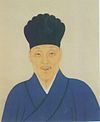
|
Zheng Jing 鄭經 Zhèng Jīng (Mandarin) Tēⁿ Keng (Taiwanese) Chhang Kîn (Hakka) (1642–1681) |
Prince of Yanping (延平王) Prince Wen of Chao (潮文王) |
November 1662 Yongli 17 |
17 March 1681 Yongli 35-1-28 |
| 4 | 
|
Zheng Kezang 鄭克臧 Zhèng Kèzāng (Mandarin) Tēⁿ Khek-chong (Taiwanese) Chhang Khiet-chong (Hakka) (1662–1681) |
Prince Regent (監國) | 17 March 1681 Yongli 35-1-28 |
19 March 1681 Yongli 35-1-30 |
| 5 | 
|
Zheng Keshuang 鄭克塽 Zhèng Kèshuǎng (Mandarin) Tēⁿ Khek-sóng (Taiwanese) Chhang Khiet-sóng (Hakka) (1670–1707) |
Prince of Yanping (延平王) Duke Haicheng (海澄公) |
19 March 1681 Yongli 35-1-30 |
5 September 1683 Yongli 37-8-13 |
* Regency of Feng Xifan from 1682 to 1683.
Taiwan under the rule of the Qing Dynasty (1683–1895)
Main article: Taiwan under Qing ruleTaiwan-Amoy Circuit (1683–1721)
The Qing dynasty invaded Taiwan; the Ming rulers surrendered and were expelled.
- Taiwan-Xiamen Circuit Commissioner (福建分巡台灣廈門道, 1687—1727)
| No. | Commissioner | Start of office |
|---|
Taiwan Circuit (1721–1885)
Qing rule was reestablished after a month-long revolt. The Taiwan Circuit was established in 1727 with its seat in Taiwan-fu, unlike its predecessor, the Taiwan-Amoy Circuit, which was based in Xiamen. The Taiwan Circuit Commissioner had its powers checked by the Taiwan Circuit Investigating censors.
|
|
- Taiwan Military Circuit Commissioner (福建分巡臺灣兵備道, 1767-1791)
| No. | Commissioner | Start of office |
|---|
- Provincial Censor-ranked Taiwan Military Circuit Commissioner (按察使銜分巡台灣兵備道, 1791-1895)
| No. | Commissioner | Start of office |
|---|
Governor of Fukien-Taiwan Province (1885–1895)
| No. | Portrait | Name (Birth–Death) |
Ancestry | Original Post | Term of Office (Lunar calendar) |
Monarch (Reign) | |
|---|---|---|---|---|---|---|---|
| 1 | 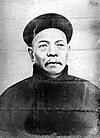
|
Liu Mingchuan 劉銘傳 Liú Míngchuán (Mandarin) Lâu Bêng-thoân (Taiwanese) Liù Mèn-chhòn (Hakka) (1836–1896) |
Hefei, Anhui | Governor of Fukien | 12 October 1885 Guangxu 11-9-5 |
4 June 1891 Guangxu 17-4-28 |

Guangxu Emperor |
| — | 
|
Shen Yingkui 沈應奎 Shěn Yìngkuí (Mandarin) Tîm Èng-khe (Taiwanese) Chhṳ̀m En-khùi (Hakka) |
Pinghu, Zhejiang | Civil Affairs Minister, Fukien Province | 4 June 1891 Guangxu 17-4-28 |
25 November 1891 Guangxu 17-10-24 | |
| 2 | 
|
Shao Youlian 邵友濂 Shào Yǒulián (Mandarin) Siō Iú-liâm (Taiwanese) Seu Yû-liàm (Hakka) (1840–1901) |
Yuyao, Zhejiang | Governor of Hunan | 9 May 1891 Guangxu 17-4-2 |
13 October 1894 Guangxu 20-9-15 | |
| 3 | 
|
Tang Jingsong 唐景崧 Táng Jǐngsōng (Mandarin) Tn̂g Kéng-siông (Taiwanese) Thòng Kín-chhiùng (Hakka) (1841–1903) |
Guanyang, Guangxi | Civil Affairs Minister, Fukien-Taiwan Province | 13 October 1894 Guangxu 20-9-15 |
20 May 1895 Guangxu 21-4-26 | |
Republic of Formosa (1895)
Main article: Republic of FormosaThe Republic of Formosa was a short-lived republic that existed on the island of Taiwan in 1895 between the formal cession of Taiwan by the Qing dynasty of China to the Empire of Japan by the Treaty of Shimonoseki and its being taken over by Japanese troops. The Republic was proclaimed on 23 May 1895 and extinguished on 21 October, when the Republican capital Tainan was taken over by the Japanese.
| No. | Portrait | Name
(Birth–Death) |
Place of Birth | Term of Office | Days | |
|---|---|---|---|---|---|---|
| 1 | 
|
Tang Ching-sung
唐景崧 Táng Jǐngsōng (Mandarin) |
Guilin, Guangxi, |
25 May 1895 | 5 June 1895
Yongqing 1-6-5 |
13 |
| 2 | 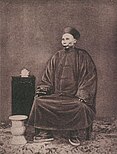
|
Liu Yung-fu
劉永福 Liú Yǒngfú (Mandarin) |
Qinzhou, Guangxi, |
5 June 1895
Yongqing 1-6-5 |
21 October 1895
Yongqing 1-10-21 |
138 |
Taiwan under Japanese rule (1895–1945)
Main articles: Taiwan under Japanese rule and Government-General of TaiwanAfter the First Sino-Japanese War and establishing control over the island through the Treaty of Shimonoseki, the Japanese Empire used the French Empire model of an occupying force and were instrumental in the industrialization of the island; they built railroads, a sanitation system and a public school educational system, among other things. Around 1935, the Japanese began an island-wide assimilation project to bind the island more firmly to the empire.
In 1941, the Pacific War broke out when the Japanese Empire attacked the U.S. naval port of Pearl Harbor in Hawaii. By 1945, desperate plans were in place to incorporate popular representation of Taiwan into the Imperial Diet to end colonial rule of the island and transfer occupying troops to the front lines to fight the Allies. The names listed here are the Japanese governor-generals:
Governors-General of Taiwan (1895–1945)
Main article: Governor-General of TaiwanMilitary Rikken Seiyūkai Kenseikai Rikken Minseitō
| No. | Portrait | Name | Origin | Occupation | Affiliation | Term of Office | Monarch (Reign) | |
|---|---|---|---|---|---|---|---|---|
| 1 | 
|
Kabayama Sukenori 樺山資紀 |
Kagoshima | Admiral (Imperial Japanese Navy) (Viscount) | Military | 10 May 1895 | 2 June 1896 | 
Emperor Meiji |
| 2 | 
|
Katsura Tarō 桂太郎 |
Yamaguchi | Lieutenant General (Imperial Japanese Army) (Viscount) | Military | 2 June 1896 | 14 October 1896 | |
| 3 | 
|
Nogi Maresuke 乃木希典 |
Yamaguchi | Lieutenant General (Imperial Japanese Army) (Baron) | Military | 14 October 1896 | 26 February 1898 | |
| 4 | 
|
Kodama Gentarō 兒玉源太郎 |
Yamaguchi | Lieutenant General (Imperial Japanese Army) (Baron) | Military | 26 February 1898 | 11 April 1906 | |
| 5 | 
|
Sakuma Samata 佐久間左馬太 |
Yamaguchi | General (Imperial Japanese Army) (Viscount) | Military | 11 April 1906 | 1 May 1915 | |

Emperor Taishō | ||||||||
| 6 | 
|
Andō Teibi 安東貞美 |
Nagano | General (Imperial Japanese Army) (Baron) | Military | 1 May 1915 | 6 June 1918 | |
| 7 | 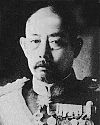
|
Akashi Motojiro 明石元二郎 |
Fukuoka | Lieutenant General (Imperial Japanese Army) | Military | 6 June 1918 | 24 October 1919 | |
| 8 | 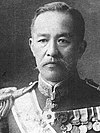
|
Den Kenjirō 田健治郎 |
Hyōgo | Member of Terauchi Cabinet (Baron) | Seiyūkai | 29 October 1919 | 6 September 1923 | |
| 9 | 
|
Uchida Kakichi 內田嘉吉 |
Tokyo | Member of House of Peers | Seiyūkai | 6 September 1923 | 1 September 1924 | |
| 10 | 
|
Izawa Takio 伊澤多喜男 |
Nagano | Member of House of Peers | Kenseikai | 1 September 1924 | 16 July 1926 | |
| 11 | 
|
Kamiyama Mitsunoshin 上山滿之進 |
Yamaguchi | literary figure | Kenseikai | 16 July 1926 | 16 June 1928 | |

Emperor Shōwa | ||||||||
| 12 | 
|
Kawamura Takeji 川村竹治 |
Akita | Member of House of Peers | Seiyūkai | 16 June 1928 | 30 July 1929 | |
| 13 | 
|
Ishizuka Eizō 石塚英藏 |
Fukushima | Member of House of Peers | Minseitō | 30 July 1929 | 16 January 1931 | |
| 14 | 
|
Ōta Masahiro 太田政弘 |
Yamagata | Director of Kwantung Leased Territory | Minseitō | 16 January 1931 | 2 March 1932 | |
| 15 | 
|
Minami Hiroshi 南弘 |
Toyama | Member of House of Peers | Seiyūkai | 2 March 1932 | 26 May 1932 | |
| 16 | 
|
Nakagawa Kenzō 中川健蔵 |
Niigata | Undersecretary of Education | Minseitō | 26 May 1932 | 2 September 1936 | |
| 17 | 
|
Kobayashi Seizō 小林躋造 |
Hiroshima | Admiral (Imperial Japanese Navy) | Military | 2 September 1936 | 27 November 1940 | |
| 18 | 
|
Hasegawa Kiyoshi 長谷川清 |
Fukui | Admiral (Imperial Japanese Navy) | Military | 27 November 1940 | 30 December 1944 | |
| 19 | 
|
Andō Rikichi 安藤利吉 |
Miyagi | General (Imperial Japanese Army) | Military | 30 December 1944 | 25 October 1945 | |
Taiwan under the rule of the Republic of China (1945–present)
Main articles: History of Taiwan (1945–present) and Government of the Republic of ChinaFollowing the end of World War II in 1945, under the terms of the Instrument of Surrender of Japan, the control of Taiwan was to be transferred to the Republic of China (ROC). ROC troops were authorized to come to Taiwan to accept the surrender of Japanese military forces and occupy Taiwan on behalf of the Allied Powers in General Order No. 1, issued by Douglas MacArthur, the Supreme Commander of the Allied Powers, on 2 September 1945. ROC troops were later transported to Keelung by the U.S. Navy, and Japanese handed the control of Taiwan to the ROC on 25 October 1945, which began a period of military occupation.
Following its defeat in the Chinese Civil War in 1949, Premier Yan Xishan proclaimed the ROC Government's relocation to Taiwan (where it exists until today), thus replacing the Provincial Chairperson as the highest-ranked executive official on Taiwan. This lasted until March 1950, when Chiang Kai-shek resumed his duties as President in Taipei. However, Japan relinquished sovereignty of Taiwan and Penghu in the Treaty of San Francisco on 28 April 1952, without specifying whom the sovereignty was ceded to. Because the ROC only held Taiwan, Penghu and other nearby islands, the regime remained the internationally recognized government of China with sovereignty throughout mainland China, Tibet Area, Sinkiang and Outer Mongolia until recognition shifted to the People's Republic of China by the United Nations in 1971 and the United States in 1979. After the constitutional amendments in 1991, the president is elected by popular vote among citizens of the Republic of China in the "Free Area of the Republic of China" (area under de facto Republic of China administration), instead of by the National Assembly.
Kuomintang Democratic Progressive Party
Governor of Taiwan Province (1945–1949)
Main articles: Taiwan Province and Taiwan Provincial Government| No. | Portrait | Name (Birth–Death) |
Term of Office | Political Party | |
|---|---|---|---|---|---|
| Chief Executive of Taiwan Province | |||||
| 1 | 
|
Chen Yi 陳儀 (1883-1950) |
29 August 1945 | 22 April 1947 | Kuomintang |
| Chairperson of the Taiwan Provincial Government | |||||
| 1 | 
|
Wei Tao-ming 魏道明 (1899-1978) |
16 May 1947 | 5 January 1949 | Kuomintang |
| 2 | 
|
Chen Cheng 陳誠 (1897–1965) |
5 January 1949 | 8 December 1949 | Kuomintang |
Presidents of the Executive Yuan of the Republic of China (1949–1950)
Main articles: Premier of the Republic of China and List of premiers of the Republic of China| No. | Portrait | Name (Birth–Death) |
Term of office | Political party | ||||
|---|---|---|---|---|---|---|---|---|
| 30 | 
|
Yan Xishan 閻錫山 (1883–1960) |
8 December 1949 | 1 March 1950 | Kuomintang | |||
Presidents of the Republic of China (1 March 1950–present)
Main articles: President of the Republic of China and List of presidents of the Republic of China| No. | Portrait | Name (Birth–Death) |
Term of office | Term | Elections (votes / percentages) |
Political party | Vice President | |
|---|---|---|---|---|---|---|---|---|
| Presidents elected by the National Assembly | ||||||||
| 1 | 
|
Chiang Kai-shek 蔣中正 (1887–1975) |
1 March 1950 | 20 May 1954 | 1 | — | Kuomintang | Li Zongren (1950–1954) Vacant (1954) |
| 20 May 1954 | 20 May 1960 | 2 | 1954 (1,507 / 96.91%) | Chen Cheng | ||||
| 20 May 1960 | 20 May 1966 | 3 | 1960 (1,481 / 93.97%) | Chen Cheng (1960–1965) Vacant (1965-1966) | ||||
| 20 May 1966 | 20 May 1972 | 4 | 1966 (1,405 / 98.60%) | Yen Chia-kan | ||||
| 20 May 1972 | 5 April 1975 | 5 | 1972 (1,308 / 99.39%) | |||||
| 2 | 
|
Yen Chia-kan 嚴家淦 (1905–1993) |
6 April 1975 | 20 May 1978 | — | Kuomintang | Vacant | |
| 3 | 
|
Chiang Ching-kuo 蔣經國 (1910–1988) |
20 May 1978 | 20 May 1984 | 6 | 1978 (1,184 / 98.34%) | Kuomintang | Hsieh Tung-min |
| 20 May 1984 | 13 January 1988 | 7 | 1984 (1,012 / 95.11%) | Lee Teng-hui | ||||
| 4 | 
|
Lee Teng-hui 李登輝 (1923–2020) |
13 January 1988 | 20 May 1990 | — | Kuomintang | Vacant | |
| 20 May 1990 | 20 May 1996 | 8 | 1990 (641 / 85.24%) | Lee Yuan-tsu | ||||
| Presidents elected by popular vote | ||||||||
| 4 | 
|
Lee Teng-hui 李登輝 (1923–2020) |
20 May 1996 | 20 May 2000 | 9 | 1996 (5,813,699 / 54.0%) | Kuomintang | Lien Chan |
| 5 | 
|
Chen Shui-bian 陳水扁 (born 1950) |
20 May 2000 | 20 May 2004 | 10 | 2000 (4,977,737 / 39.3%) | Democratic Progressive | Annette Lu |
| 20 May 2004 | 20 May 2008 | 11 | 2004 (6,446,900 / 50.11%) | |||||
| 6 | 
|
Ma Ying-jeou 馬英九 (born 1950) |
20 May 2008 | 20 May 2012 | 12 | 2008 (7,658,724 / 58.45%) | Kuomintang | Vincent Siew |
| 20 May 2012 | 20 May 2016 | 13 | 2012 (6,891,139 / 51.60%) | Wu Den-yih | ||||
| 7 | 
|
Tsai Ing-wen 蔡英文 (born 1956) |
20 May 2016 | 20 May 2020 | 14 | 2016 (6,894,744 / 56.1%) | Democratic Progressive | Chen Chien-jen |
| 20 May 2020 | 20 May 2024 | 15 | 2020 (8,170,231 / 57.13%) | Lai Ching-te | ||||
| 8 | 
|
Lai Ching-te 賴清德 (born 1959) |
20 May 2024 | Incumbent | 16 | 2024 (5,586,019 / 40.05%) | Democratic Progressive | Hsiao Bi-khim |
See also
References
- Information from 郭弘斌 (2003)
- ^ Died in office.
- As acting; Fukien-Taiwan Province Civil Affairs Minister.
- HC Deb 04 February 1955 vol 536 c159W. "In September, 1945, the administration of Formosa was taken over from the Japanese by Chinese forces at the direction of the Supreme Commander of the Allied Powers; but this was not a cession, nor did it in itself involve any change of sovereignty. The arrangements made with Chiang Kai-shek put him there on a basis of military occupation pending further arrangements, and did not of themselves constitute the territory Chinese."
- Impeached, recalled in 1954.
- Chen Cheng, Died on 5 March 1965.